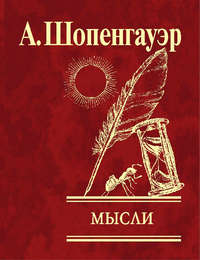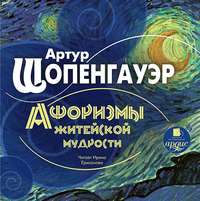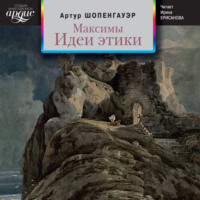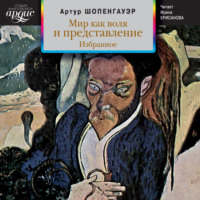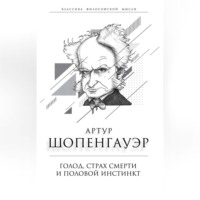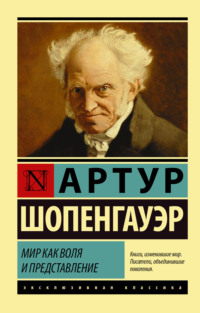 полная версия
полная версияThe World as Will and Idea (Vol. 3 of 3)
Perhaps we would have to except whoever had once said from the bottom of his heart, with regard to this game, “I want no more.” But this is not yet the place to speak of this.
But we have certainly to draw attention to the fact that the pain of birth and the bitterness of death are the two constant conditions under which the will to live maintains itself in its objectification, i. e., our inner nature, untouched by the course of time and the death of races, exists in an everlasting present, and enjoys the fruit of the assertion of the will to live. This is analogous to the fact that we can only be awake during the day on condition that we sleep during the night; indeed the latter is the commentary which nature offers us for the understanding of that difficult passage.29
For the substratum, or the content, πληρωμα, or the material of the present, is through all time really the same. The impossibility of knowing this identity directly is just time, a form and limitation of our intellect. That on account of it, for example, the future event is not yet, depends upon an illusion of which we become conscious when that event has come. That the essential form of our intellect introduces such an illusion explains and justifies itself from the fact that the intellect has come forth from the hands of nature by no means for the apprehension of the nature of things, but merely for the apprehension of motives, thus for the service of an individual and temporal phenomenon of will.30
Whoever comprehends the reflections which here occupy us will also understand the true meaning of the paradoxical doctrine of the Eleatics, that there is no arising and passing away, but the whole remains immovable: “Παρμενιδης και Μελισσος ανῃρουν γενεσιν και φθοραν, δια το νομιξειν το παν ακινητον” (Parmenides et Melissus ortum et interitum tollebant, quoniam nihil moveri putabant), Stob. Ecl., i. 21. Light is also thrown here upon the beautiful passage of Empedocles which Plutarch has preserved for us in the book, “Adversus Coloten,” c. 12: —
“Νηπιοι; ου γαρ σφιν δολιχοφρονες εισι μεριμναι,Οἱ δη γινεσθαι παρος ουκ εον ελπιζουσι,Η τι καταθνησκειν και εξολλυσθαι ἁπαντη.Ουκ αν ανηρ τοιαυτα σοφος φρεσι μαντευσαιτο,Ὡς οφρα μεν τε βιωσι (το δη βιοτον καλεουσι),Τοφρα μεν ουν εισιν, και σφιν παρα δεινα και ἐσθλαΠριν τε παγεν τε βροτοι, και επει λυθεν, ουδεν αρ᾽ ἐισιν.”(Stulta, et prolixas non admittentia curasPectora: qui sperant, existere posse, quod anteNon fuit, aut ullam rem pessum protinus ire; —Non animo prudens homo quod præsentiat ullus,Dum vivunt (namque hoc vitaï nomine signant),Sunt, et fortuna tum conflictantur utraque:Ante ortum nihil est homo, nec post funera quidquam.)The very remarkable and, in its place, astonishing passage in Diderot's “Jacques le fataliste,” deserves not less to be mentioned here: “Un château immense, au frontispice duquel on lisait: ‹ Je n'appartiens à personne, et j'appartiens à tout le monde: vous y étiez avant que d'y entrer, vous y serez encore, quand vous en sortirez ›.”
Certainly in the sense in which, when he is begotten, the man arises out of nothing, he becomes nothing through death. But really to learn to know this “nothing” would be very interesting; for it only requires moderate acuteness to see that this empirical nothing is by no means absolute, i. e., such as would in every sense be nothing. We are already led to this insight by the observation that all qualities of the parents recur in the children, thus have overcome death. Of this, however, I will speak in a special chapter.
There is no greater contrast than that between the ceaseless flight of time, which carries its whole content with it, and the rigid immobility of what is actually present, which at all times is one and the same. And if from this point of view we watch in a purely objective manner the immediate events of life, the Nunc stans becomes clear and visible to us in the centre of the wheel of time. To the eye of a being of incomparably longer life, which at one glance comprehended the human race in its whole duration, the constant alternation of birth and death would present itself as a continuous vibration, and accordingly it would not occur to it at all to see in this an ever new arising out of nothing and passing into nothing; but just as to our sight the quickly revolving spark appears as a continuous circle, the rapidly vibrating spring as a permanent triangle, the vibrating cord as a spindle, so to this eye the species would appear as that which has being and permanence, death and life as vibrations.
We will have false conceptions of the indestructibility of our true nature by death, so long as we do not make up our minds to study it primarily in the brutes, but claim for ourselves alone a class apart from them, under the boastful name of immortality. But it is this pretension alone, and the narrowness of view from which it proceeds, on account of which most men struggle so obstinately against the recognition of the obvious truth that we are essentially, and in the chief respect, the same as the brutes; nay, that they recoil at every hint of our relationship with these. But it is this denial of the truth which more than anything else closes against them the path to real knowledge of the indestructibility of our nature. For if we seek anything upon a wrong path, we have just on that account forsaken the right path, and upon the path we follow we will never attain to anything in the end but late disillusion. Up, then, follow the truth, not according to preconceived notions, but as nature leads! First of all, learn to recognise in the aspect of every young animal the existence of the species that never grows old, which, as a reflection of its eternal youth, imparts to every individual a temporary youth, and lets it come forth as new and fresh as if the world were of to-day. Let one ask himself honestly whether the swallow of this year's spring is absolutely a different one from the swallow of the first spring, and whether really between the two the miracle of the creation out of nothing has repeated itself millions of times, in order to work just as often into the hands of absolute annihilation. I know well that if I seriously assured any one that the cat which now plays in the yard is still the same one which made the same springs and played the same tricks there three hundred years ago, he would think I was mad; but I also know that it is much madder to believe that the cat of to-day is through and through and in its whole nature quite a different one from the cat of three hundred years ago. One only requires truly and seriously to sink oneself in the contemplation of one of these higher vertebrates in order to become distinctly conscious that this unfathomable nature, taken as a whole, as it exists there, cannot possibly become nothing; and yet, on the other hand, one knows its transitoriness. This depends upon the fact that in this animal the infinite nature of its Idea (species) is imprinted in the finiteness of the individual. For in a certain sense it is of course true that in the individual we always have before us another being – in the sense which depends upon the principle of sufficient reason, in which are also included time and space, which constitute the principium individuationis. But in another sense it is not true – in the sense in which reality belongs to the permanent forms of things, the Ideas alone, and which was so clearly evident to Plato that it became his fundamental thought, the centre of his philosophy; and he made the comprehension of it the criterion of capacity for philosophising in general.
As the scattered drops of the roaring waterfall change with lightning rapidity, while the rainbow, whose supporter they are, remains immovably at rest, quite untouched by that ceaseless change, so every Idea, i. e., every species of living creature remains quite untouched by the continual change of its individuals. But it is the Idea, or the species in which the will to live is really rooted, and manifests itself; and therefore also the will is only truly concerned in the continuance of the species. For example, the lions which are born and die are like the drops of the waterfall; but the leonitas, the Idea or form of the lion, is like the unshaken rainbow upon it. Therefore Plato attributed true being to the Ideas alone, i. e., to the species; to the individuals only a ceaseless arising and passing away. From the profound consciousness of his imperishable nature really springs also the confidence and peace of mind with which every brute, and even human individual, moves unconcernedly along amid a host of chances, which may annihilate it any moment, and, moreover, moves straight on to death: out of its eyes, however, there shines the peace of the species, which that death does not affect, and does not concern. Even to man this peace could not be imparted by uncertain and changing dogmas. But, as was said, the contemplation of every animal teaches that death is no obstacle to the kernel of life, to the will in its manifestation. What an unfathomable mystery lies, then, in every animal! Look at the nearest one; look at your dog, how cheerfully and peacefully he lives! Many thousands of dogs have had to die before it came to this one's turn to live. But the death of these thousands has not affected the Idea of the dog; it has not been in the least disturbed by all that dying. Therefore the dog exists as fresh and endowed with primitive force as if this were its first day and none could ever be its last; and out of its eyes there shines the indestructible principle in it, the archæus. What, then, has died during those thousands of years? Not the dog – it stands unscathed before us; merely its shadow, its image in our form of knowledge, which is bound to time. Yet how can one even believe that that passes away which for ever and ever exists and fills all time? Certainly the matter can be explained empirically; in proportion as death destroyed the individuals, generation produced new ones. But this empirical explanation is only an apparent explanation: it puts one riddle in the place of the other. The metaphysical understanding of the matter, although not to be got so cheaply, is yet the only true and satisfying one.
Kant, in his subjective procedure, brought to light the truth that time cannot belong to the thing in itself, because it lies pre-formed in our apprehension. Now death is the temporal end of the temporal phenomenon; but as soon as we abstract time, there is no longer any end, and this word has lost all significance. But I, here upon the objective path, am trying to show the positive side of the matter, that the thing in itself remains untouched by time, and by that which is only possible through time, arising and passing away, and that the phenomena in time could not have even that ceaselessly fleeting existence which stands next to nothingness, if there were not in them a kernel of the infinite. Eternity is certainly a conception which has no perception as its foundation; accordingly it has also a merely negative content; it signifies a timeless existence. Time is yet merely an image of eternity, ὁ χρονος εἰκων τον αἰωνος, as Plotinus has it; and in the same way our temporal existence is a mere image of our true nature. This must lie in eternity, just because time is only the form of our knowledge; but on account of this alone do we know our own existence, and that of all things as transitory, finite, and subject to annihilation.
In the second book I have shown that the adequate objectivity of the will as the thing in itself, at each of its grades, is the (Platonic) Idea; similarly in the third book that the Ideas of things have the pure subject of knowledge as their correlative; consequently the knowledge of them only appears exceptionally and temporarily under specially favourable conditions. For individual knowledge, on the other hand, thus in time, the Idea presents itself under the form of the species, which is the Idea broken up through its entrance into time. Therefore the species is the most immediate objectification of the thing in itself, i. e., of the will to live. The inmost nature of every brute, and also of man, accordingly lies in the species; thus the will to live, which is so powerfully active, is rooted in this, not really in the individual. On the other hand, in the individual alone lies the immediate consciousness: accordingly it imagines itself different from the species, and therefore fears death. The will to live manifests itself in relation to the individual as hunger and the fear of death: in relation to the species as sexual instinct and passionate care for the offspring. In agreement with this we find nature, which is free from that delusion of the individual, as careful for the maintenance of the species as it is indifferent to the destruction of the individuals: the latter are always only means, the former is the end. Therefore a glaring contrast appears between its niggardliness in the endowment of the individuals and its prodigality when the species is concerned. In the latter case from one individual are often annually obtained a hundred thousand germs, and more; for example, from trees, fishes, crabs, termites, and many others. In the former case, on the contrary, only barely enough in the way of powers and organs is given to each to enable it with ceaseless effort to maintain its life. And, therefore, if an animal is injured or weakened it must, as a rule, starve. And where an incidental saving was possible, through the circumstance that one part could upon necessity be dispensed with, it has been withheld, even out of order. Hence, for example, many caterpillars are without eyes; the poor creatures grope in the dark from leaf to leaf, which, since they lack feelers, they do by moving three-fourths of their body back and forward in the air, till they find some object. Hence they often miss their food which is to be found close by. But this happens in consequence of the lex parsimoniæ naturæ, to the expression of which natura nihil facit supervacaneum one may add et nihil largitur. The same tendency of nature shows itself also in the fact that the more fit the individual is, on account of his age, for the propagation of the species, the more powerfully does the vis naturæ medicatrix manifest itself in him, and therefore his wounds heal easily, and he easily recovers from diseases. This diminishes along with the power of generation, and sinks low after it is extinct; for now in the eyes of nature the individual has become worthless.
If now we cast another glance at the scale of existences, with the whole of their accompanying gradations of consciousness, from the polyp up to man, we see this wonderful pyramid, kept in ceaseless oscillation certainly by the constant death of the individuals, yet by means of the bond of generation, enduring in the species through the infinite course of time. While, then, as was explained above, the objective, the species, presents itself as indestructible, the subjective, which consists merely in the self-consciousness of these beings, seems to be of the shortest duration, and to be unceasingly destroyed, in order, just as often, to come forth again from nothing in an incomprehensible manner. But, indeed, one must be very short-sighted to let oneself be deceived by this appearance, and not to comprehend that, although the form of temporal permanence only belongs to the objective, the subjective, i. e., the will, which lives and manifests itself in all, and with it the subject of the knowledge in which all exhibits itself, must be not less indestructible; because the permanence of the objective, or external, can yet only be the phenomenal appearance of the indestructibility of the subjective or internal; for the former can possess nothing which it has not received on loan from the latter; and cannot be essentially and originally an objective, a phenomenon, and then secondarily and accidentally a subjective, a thing in itself, a self-consciousness. For clearly the former as a manifestation presupposes something which manifests itself, as being for other presupposes a being for self, and as object presupposes a subject; and not conversely: because everywhere the root of things must lie in that which they are for themselves, thus in the subjective, not in the objective, i. e., in that which they are only for others, in a foreign consciousness. Accordingly we found in the first book that the right starting-point for philosophy is essentially and necessarily the subjective, i. e., the idealistic starting-point; and also that the opposite starting-point, that which proceeds from the objective, leads to materialism. At bottom, however, we are far more one with the world than we commonly suppose: its inner nature is our will, its phenomenal appearance is our idea. For any one who could bring this unity of being to distinct consciousness, the difference between the continuance of the external world after his death and his own continuance after death would vanish. The two would present themselves to him as one and the same; nay, he would laugh at the delusion that could separate them. For the understanding of the indestructibility of our nature coincides with that of the identity of the macrocosm and the microcosm. Meanwhile one may obtain light upon what is said here by a peculiar experiment, performed by means of the imagination, an experiment which might be called metaphysical. Let any one try to present vividly to his mind the time, in any case not far distant, when he will be dead. Then he thinks himself away and lets the world go on existing; but soon, to his own astonishment, he will discover that he was nevertheless still there. For he intended to present the world to his mind without himself; but the ego is the immediate element in consciousness, through which alone the world is brought about, and for which alone it exists. This centre of all existence, this kernel of all reality, is to be abolished, and yet the world is to go on existing; it is a thought which can be conceived in the abstract, but not realised. The endeavour to accomplish this, the attempt to think the secondary without the primary, the conditioned without the condition, that which is supported without the supporter, always fails, much in the same way as the attempt to think an equilateral, right-angled triangle, or a destruction or origination of matter, and similar impossibilities. Instead of what was intended, the feeling here presses upon us that the world is not less in us than we in it, and that the source of all reality lies within us. The result is really this: the time when I shall not be will objectively come; but subjectively it can never come. It might therefore, indeed, be asked, how far every one, in his heart, actually believes in a thing which he really cannot conceive at all; or whether, since the profound consciousness of the indestructibleness of our true nature associates itself with that merely intellectual experiment, which, however, has already been made more or less distinctly by every one, whether, I say, our own death is not perhaps for us at bottom the most incredible thing in the world.
The deep conviction of the indestructibleness of our nature through death, which, as is also shown by the inevitable qualms of conscience at its approach, every one carries at the bottom of his heart, depends altogether upon the consciousness of the original and eternal nature of our being: therefore Spinoza expresses it thus: “Sentimus, experimurque, nos æternos esse.” For a reasonable man can only think of himself as imperishable, because he thinks of himself as without beginning, as eternal, in fact as timeless. Whoever, on the other hand, regards himself as having become out of nothing must also think that he will again become nothing; for that an eternity had passed before he was, and then a second eternity had begun, through which he will never cease to be, is a monstrous thought. Really the most solid ground for our immortality is the old principle: “Ex nihilo nihil fit, et in nihilum nihil potest reverti.” Theophrastus Paracelsus very happily says (Works, Strasburg, 1603, vol. ii. p. 6): “The soul in me has arisen out of something; therefore it does not come to nothing; for it comes out of something.” He gives the true reason. But whoever regards the birth of the man as his absolute beginning must regard death as his absolute end. For both are what they are in the same sense; consequently every one can only think of himself as immortal so far as he also thinks of himself as unborn, and in the same sense. What birth is, that also is death, according to its nature and significance: it is the same line drawn in two directions. If the former is an actual arising out of nothing, then the latter is also an actual annihilation. But in truth it is only by means of the eternity of our real being that we can conceive it as imperishable, and consequently this imperishableness is not temporal. The assumption that man is made out of nothing leads necessarily to the assumption that death is his absolute end. Thus in this the Old Testament is perfectly consistent; for no doctrine of immortality is suitable to a creation out of nothing. New Testament Christianity has such a doctrine because it is Indian in spirit, and therefore more than probably also of Indian origin, although only indirectly, through Egypt. But to the Jewish stem, upon which that Indian wisdom had to be grafted in the Holy Land, such a doctrine is as little suited as the freedom of the will to its determinism, or as
“Humano capiti cervicem pictor equinam Jungere si velit.”
It is always bad if one cannot be thoroughly original, and dare not carve out of the whole wood. Brahmanism and Buddhism, on the other hand, have quite consistently, besides the continued existence after death, an existence before birth to expiate the guilt of which we have this life. Moreover, how distinctly conscious they were of the necessary consistency in this is shown by the following passage from Colebrooke's “History of the Indian Philosophy” in the “Transac. of the Asiatic London Society,” vol. i. p. 577: “Against the system of the Bhagavatas which is but partially heretical, the objection upon which the chief stress is laid by Vyaso is, that the soul would not be eternal if it were a production, and consequently had a beginning.” Further, in Upham's “Doctrine of Buddhism,” p. 110, it is said: “The lot in hell of impious persons called Deitty is the most severe: these are they who, discrediting the evidence of Buddha, adhere to the heretical doctrine that all living beings had their beginning in the mother's womb, and will have their end in death.”
Whoever conceives his existence as merely accidental must certainly fear that he will lose it by death. On the other hand, whoever sees, even only in general, that his existence rests upon some kind of original necessity will not believe that this which has produced so wonderful a thing is limited to such a brief span of time, but that it is active in every one. But he will recognise his existence as necessary who reflects that up till now, when he exists, already an infinite time, thus also an infinity of changes, has run its course, but in spite of this he yet exists; thus the Whole range of all possible states has already exhausted itself without being able to destroy his existence. If he could ever not be, he would already not be now. For the infinity of the time that has already elapsed, with the exhausted possibility of the events in it, guarantees that what exists, exists necessarily. Therefore every one must conceive himself as a necessary being, i. e., as a being whose existence would follow from its true and exhaustive definition if one only had it. In this line of thought, then, really lies the only immanent proof of the imperishableness of our nature, i. e., the only proof of this that holds good within the sphere of empirical data. In this nature existence must inhere, because it shows itself as independent of all states which can possibly be introduced through the chain of causes; for these states have already done what they could, and yet our existence has remained unshaken by it, as the ray of light by the storm wind which it cuts through. If time, of its own resources, could bring us to a happy state, then we would already have been there long ago; for an infinite time lies behind us. But also: if it could lead us to destruction, we would already have long been no more. From the fact that we now exist, it follows, if well considered, that we must at all times exist. For we are ourselves the nature which time has taken up into itself in order to fill its void; consequently it fills the whole of time, present, past, and future, in the same way, and it is just as impossible for us to fall out of existence as to fall out of space. Carefully considered, it is inconceivable that what once exists in all the strength of reality should ever become nothing, and then not be, through an infinite time. Hence has arisen the Christian doctrine of the restoration of all things, that of the Hindus of the constantly repeated creation of the world by Brahma, together with similar dogmas of the Greek philosophers. The great mystery of our being and not being, to explain which these and all kindred dogmas have been devised, ultimately rests upon the fact that the same thing which objectively constitutes an infinite course of time is subjectively an indivisible, ever present present: but who comprehends it? It has been most distinctly set forth by Kant in his immortal doctrine of the ideality of time and the sole reality of the thing in itself. For it results from this that the really essential part of things, of man, of the world, lies permanently and enduringly in the Nunc stans, firm and immovable; and that the change of the phenomena and events is a mere consequence of our apprehension of them by means of our form of perception, which is time. Accordingly, instead of saying to men, “Ye have arisen through birth, but are immortal,” one ought to say to them, “Ye are not nothing,” and teach them to understand this in the sense of the saying attributed to Hermes Trismegistus, “Το γαρ ὀν ἀει ἐσται” (Quod enim est, erit semper), Stob. Ecl., i. 43, 6. If, however, this does not succeed, but the anxious heart raises its old lament, “I see all beings arise through birth out of nothing, and after a brief term again return to this; my existence also, now in the present, will soon lie in the distant past, and I will be nothing!” – the right answer is, “Dost thou not exist? Hast thou not within thee the valuable present, after which ye children of time so eagerly strive, now within, actually within? And dost thou understand how thou hast attained to it? Knowest thou the paths which have led thee to it, that thou canst know they will be shut against thee by death? An existence of thyself after the destruction of thy body is not conceivable by thee as possible; but can it be more inconceivable to thee than thy present existence, and how thou hast attained to it? Why shouldst thou doubt but that the secret paths to this present, which stood open to thee, will also stand open to every future present?”


